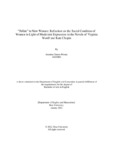Fallen” to new women: reflection on the social condition of women in light of modernist expression in the novels of Virginia Woolf and Kate Chopin

View/
Date
2022-01Publisher
Brac UniversityAuthor
Prionty, Arunima ZamanMetadata
Show full item recordAbstract
The main focus of my thesis is that I want to analyze the situation and the position of women in the society of late 19th and early 20th century in light of modernist expression and how the then society shaped women’s lives by its patriarchal norms, sexual repression and ideologies of gender. I will also represent and compare women’s situation through both of the writers’ works and show their different ideas in terms of women’s freedom and the norms of society and how the position of women changes over the time.
Women in the 19th and 20th century lived in an age characterized by gender inequality. Their position in the society was very much limited along with their rights. The society unveils gender hegemony, which governs what is most beneficial to their genre, with the majority of men belonging to the public sphere, playing an active role in their society, and the majority of women belonging to the private sphere, taking care of domestic matters. I will try to reflect in my paper how Virginia Woolf and Kate Chopin portrayed this conventional society where women’s lives were shaped by the patriarchal society. Besides, as modernist writers, Virginia Woolf and Kate Chopin also portrayed their thoughts using the modernist expressions in their writings to show the evolution of the characters. In Virginia Woolf’s novel Mrs, Dalloway, she shows Mrs. Dalloway’s character evolution through the concept of ‘stream of consciousness’. In literature, stream of consciousness refers to a narrative technique that recounts events as they occur in the characters' minds. Through this method Virginia Woolf tries to depict the conscious and subconscious thoughts of her character and how her situation affects her individually. Kate Chopin in her novel The Awakening, tries to bring up the protagonists Edna Pontellier’s sense of realization about freedom using the concept of ‘epiphany’. Epiphany is a moment of sudden and great revelation or realization which enables the characters to realize their life’s interests. Kate Chopin tries to bring up the protagonist’s ultimate realization about her freedom from the societal norms and from everything which hinders her self-growth through her epiphany. In the paper, I will focus on the technique of ‘stream of consciousness’ and the concept of ‘epiphany’ to show how it helps the protagonists to finally realize their own worth, also how it helps them to free themselves from the so called societal norms.
Therefore, the paper aims to portray the protagonists’ character evolution from ‘fallen women’ to ‘new women’ through the modernist expressions of ‘stream of consciousness’ and ‘epiphany’ which will reflect their struggle, sacrifice and dedication to change their position in the patriarchal society along with their success to overcome it.
Description
This thesis is submitted in partial fulfillment of the requirements for the degree of Bachelor of Arts in English, 2022.Department
Department of English and Humanities, Brac UniversityType
ThesisCollections
- Thesis, B.A. (English) [621]
